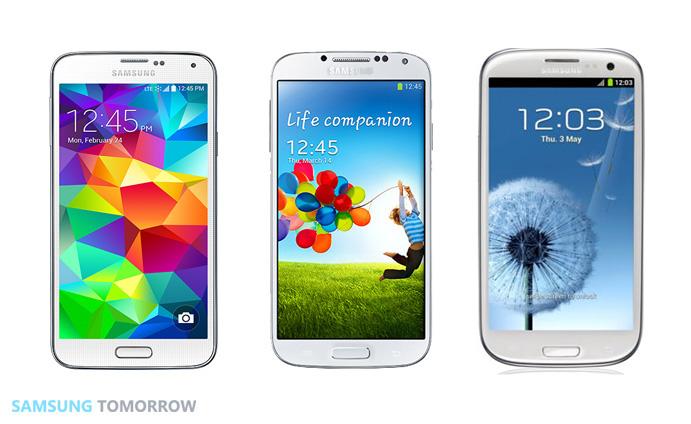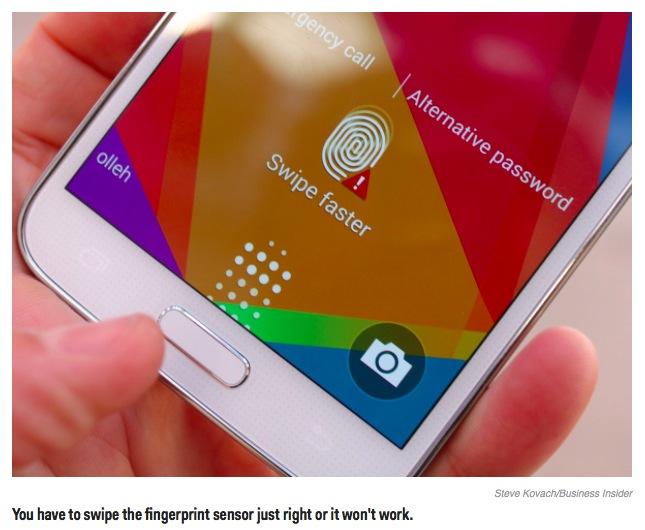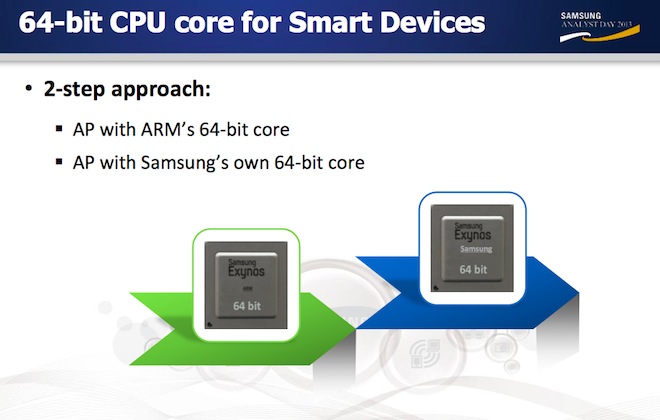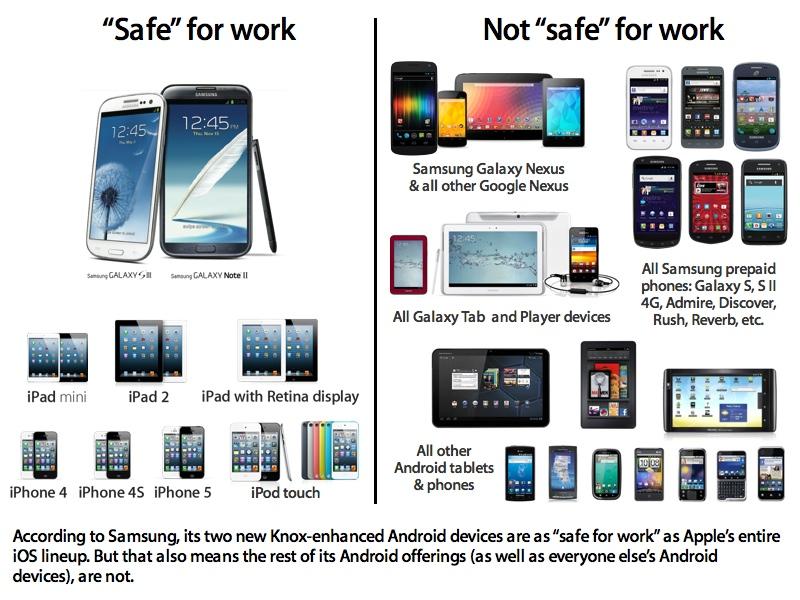Speaking to analysts and investors, a senior vice president of Samsung stated "we, as a market leader, are following the market trend" in adding biosensors to mobile devices, while sidestepping the company's delay in 64-bits and the moribund 2 percent adoption of Knox by enterprise users.
Leadership seven months behind the trend
Samsung executive Rhee In-jong, cited in a report by the Wall Street Journal, began by addressing the subject of biometric sensors.
Rather than focusing attention on Apple's Touch ID, the only functional biometric sensor to ever gain widespread adoption in a high volume product introduction, or dwell on the fact that Samsung was only able to bring its own fingerprint sensor to market seven months later in a form widely panned by critics as not as reliable, secure or easy to use, Rhee focused on a possible future involving iris scanners.
"We're looking at various types of biometric [mechanisms] and one of things that everybody is looking at is iris detection," Rhee stated, before delivering the line about leadership by following.
Rhee suggested that iris scanning would someday become available "even in low-end smartphone models," the Wall Street Journal report noted, but acknowledged that new types of sensors "will likely be available for adoption in high-end phones first."
The vast majority of Apple's iPhone sales have always been its highest end, newest model. Estimates indicate that about three fifths of Apple's 51 million iPhones sold over the winter quarter were iPhone 5s, meaning about 31.9 million iPhones shipped with Touch ID.
In stark contrast, only about a third of Samsung's phones are iPhone-class, premium models. And none of the 9 million Galaxy S4 models the company shipped alongside iPhone 5s last winter included fingerprint scanning as a feature.
It wasn't until April that Samsung was able to deliver its Galaxy 5S with a similar fingerprint scanning feature, but reaction to the new model has been less than enthusiastic.
Samsung's 64-bit issue
Neither Rhee nor the Wall Street Journal made any mention of the fact that Samsung's leading-by-following is even further behind in the area of adopting modern ARM 64-bit ABIs in its Application Processor design.
Samsung previously worked to sidestep that issue in November when it told its investors that it planned to copy Apple's A7 at some point, but didn't yet have a precise timeline for doing so yet.
Dr. Namsung Stephen Woo, president of Samsung's System LSI, alluded to Apple's 64-bit A7 Application Processor used in iPhone 5s and iPad Air, saying "many people were thinking 'why do we need 64-bit for mobile devices?' People were asking that question until three months ago, and now I think nobody is asking that question. Now people are asking 'when can we have that? And will software run correctly on time?'"
Woo told his audience, "let me just tell you, we are... we have planned for it, we are marching on schedule. We will offer the first 64-bit AP based on ARM's own core [reference design]. For the second product after that we will offer even more optimized 64-bit based on our own optimization."
Echoing Rhee's "leadership-by-following" line, Woo added, "so we are marching ahead with the 64-bit offering, and even though it's a little too early, I think we are at the leader group in terms of 64-bit offerings."" I think we are at the leader group in terms of 64-bit offerings" -Samsung System LSI president Stephen Woo
Unlike the detailed roadmap charts Samsung presented for extremely high resolution mobile displays and rapidly increasing camera sensor pixel density releases over the next two years, Woo did not offer any other details about Samsung's 64-bit AP plans, despite acknowledging that such sensors and cameras necessitated vastly greater processing power.
Woo also offered no comment on how Samsung planned to support existing software on its future 64-bit offerings, nor even whether such a chip would get custom Android support or use Samsung's own Tizen or some other operating system.
Woo also didn't outline any novel uses of 64-bit computing comparable to the applications Apple launched for the iPhone 5s, which included advanced video game graphics, enhanced audio and video processing apps like Garage Band and iMovie, and Touch ID processing and secure storage.
Terminal S5
Rather than dwelling on 64-bits or Touch ID, Samsung has focused on marketing the Galaxy S5 brand, including a two week sponsorship of London's Heathrow Terminal 5, a program Samsung called a "rebranding" of the terminal in a press release that claimed it was "the first time Heathrow has permitted a brand takeover of Terminal 5."
The airport itself subsequently issued a statement to iMore clarifying "Heathrow Terminal 5's signage and passenger wayfinding has not changed."
Instead, the facility said "Samsung have rented advertising space in Terminal 5 with a tongue-in-cheek campaign using using the line: 'Terminal Samsung Galaxy S5'."
Somewhat ironically, the ad program portrayed the new phone from the back, featuring its highly criticized plastic construction rather than the biometric sensor Samsung included on the front in a configuration following as closely as possible to the "market trend" established by iPhone 5s.
"Only a fraction" of 2% low fat Milk is pure fat
Another issue Rhee addressed in speaking to analysts and investors was the uptake of Knox, Samsung's solution for businesses concerned about the lack of security inherent in Android devices.
Apple has detailed how it "designed the iOS platform with security at its core."
In contrast, Google's Android chief Sundar Pichai has admitted that Android was expressly designed for open, hobbyist freedom, rather than enterprise users with needs for security.
To sell its phones to enterprise users, a market where Apple's iOS continues to dominate with 72 percent of devices and 93 percent of custom enterprise apps, Samsung licensed Knox.
However, Rhee noted that while the company has delivered 87 million devices embedded with Knox, only 1.8 million of those are actively using Knox.
"That's just a fraction of what has been distributed to the market," the Wall Street Journal noted. Specifically, that fraction would be about 1/50, or 2 percent.
"Rhee said he hopes that demand for Samsung's Knox system will 'trickle down' to other industry players, once the company has won enough certification and orders from the regulated industries. He declined to comment on how many paid customers the company has won so far with its Knox system," the report stated.
Shortly after Knox was introduced on the Galaxy Note 3 last fall, Mordechai Guri, a researcher at Ben-Gurion University's Cyber Security Lab described a vulnerability that he detailed would "would allow a hacker to 'easily intercept' secure data of a user of a Knox-enabled Galaxy smartphone."
In a worst-case scenario, Guri stated, "a hacker could modify data and even insert hostile code that could run amok within the secured network."
Six months later, the Wall Street Journal described the issue as "a possible security gap" and said that Samsung had "clarified" that the issue "is not specific to Samsung devices."
Samsung is working hard to sell Knox-enabled Galaxy devices to the U.S. Department of Defense and other high security clients, a market Apple has rapidly won away from BlackBerry.
 Daniel Eran Dilger
Daniel Eran Dilger










-m.jpg)






 Christine McKee
Christine McKee
 Malcolm Owen
Malcolm Owen

 Charles Martin
Charles Martin


 Mike Wuerthele
Mike Wuerthele



-m.jpg)






77 Comments
Leads By Following?
That has to be a mistranslation, right?
I don't know for sure though, my whole strategy with new languages in school was to 'pass by failing'.
Samsung had "clarified" that the issue "is not specific to Samsung devices."
That doesn't strike me as a very good PR response to a major security issue.
Looks like the Samsung devices need to move to the other side of the line.
What? Leads-by-following? What does that mean?
In Apple-cult world it is read as Samsung leads [in,by] following Apple.
Leading-by-following, innovating-by-copying, telling the truth-by-lying, .... all the same to these folks.
I guess "leads by following", as crazy as it sounds, is better than "leads by copying".